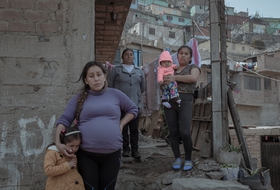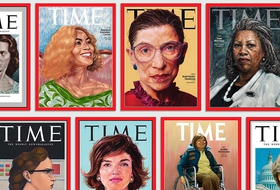
One in three women have suffered physical or sexual violence. With contributions from Europe, Africa, Asia and Latin America, we look at how this shadow pandemic affects every corner of the world.
10 talented and ambitious women living in the village of Cyeza, in Rwanda’s Muhanga district, formed a cooperative in 2006. They wanted to develop their artistic specialty, weaving with sisal fibres, and make a living out of it. Each woman has her own story to tell, but they all share one thing: the determination to
10 talented and ambitious women living in the village of Cyeza, in Rwanda’s Muhanga district, formed a cooperative in 2006. They wanted to develop their artistic specialty, weaving with sisal fibres, and make a living out of it. Each woman has her own story to tell, but they all share one thing: the determination to bring financial security to their families.
Yusta launched the initiative. After receiving professional training on basket weaving she called friends, and friend of friends, to teach them the necessary skills and ask them to unite with her.
With a positive outlook on life, Yusta and her companions have moulded a space for themselves where they can gather, develop and exchange new skills, designing innovative products and overcoming everyday struggles. The women of the Abarikumwe Association, which literally means “people who are together” strongly believe in the advantages of joining associations, as well as the power of hard work combined with their passion for crafts in lifting them out of poverty.
Azizi Life, a social enterprise connecting talented local artists to the wider world has been working with them since 2008. It has given them access to the global market and encouraged them to be evermore creative by producing funky items such as bracelets, earrings, Christmas decorations and napkin rings.
The women now make around 50,000 Rwandan Francs ($72.50) a month. With this income they help their families and communities and invest in land. Yusta, for example, bought a small plot of land on which to plant coffee. She sold the coffee and rented other plots on which to plant beans. With the income from weaving and coffee combined she was able to purchase a stunning home for her family of seven, with a plantation and a big garden.
Yusta’s companions, the Abarikumwe women, have also found creative ways to save. Their personal savings aren’t in banks but, rather, they eat and breathe. Most often, they come in the shape of pigs and sometimes cattle if they can afford it. Bearing in mind that one pig can birth up to 10 piglets, which can each be sold for 100,000 Rwandan Francs ($145) once they grow up, this is a smart investment.
The Abarikumwe women’s stories show how anyone, regardless of how poor they are, can rely on their adaptive capacities, using creativity and innovation to cope with their living conditions and environment. This is the fabric of Africa that is being celebrated through the hashtag #TheAfricaTheMediaNeverShowsYou, created by young Africans to show you the Africa that doesn’t make the headlines.
Siamo anche su WhatsApp. Segui il canale ufficiale LifeGate per restare aggiornata, aggiornato sulle ultime notizie e sulle nostre attività.
![]()
Quest'opera è distribuita con Licenza Creative Commons Attribuzione - Non commerciale - Non opere derivate 4.0 Internazionale.
One in three women have suffered physical or sexual violence. With contributions from Europe, Africa, Asia and Latin America, we look at how this shadow pandemic affects every corner of the world.
The Istanbul Convention against gender-based and domestic violence marks its tenth anniversary. We look at what it is, who its signatories are, and what the future might hold.
European Commission President Ursula von der Leyen reminded us of the gravity of violence against women around the world, and of the Istanbul Convention’s utmost importance.
President Erdoğan has pulled Turkey out of the Istanbul Convention, key in the fight against gender violence, claiming that it favours the LGBT community rather than family values.
Violence against women in Peru has increased as a result of Covid-19 lockdowns. 14,912 people were reported missing from January to November 2020, more than half of them minors and 64 per cent women. People have been confined to their homes for months, many forced to endure poor physical, economic and social conditions. A situation that
Joys Estefani Qqueccaño Huamani, 24, disappeared from her rural community in Peru on 9 October. Her family began looking for her independently of the authorities and despite the resistance of relatives of Joys Estefani’s ex-partner Arturo Ccana Condori, 32, charged with committing violence against her on 28 September, eleven days before Joys Estefani disappeared. Photos
Costa Rica celebrated its first same-sex marriage when two women, Alexandra Quiros and Dunia Araya, celebrated their wedding: an “extraordinary moment”.
The pandemic and its restrictions are affecting everyone, without exceptions. However factors like housing, income inequalities, gender, access to technology and working conditions are influencing how people experience the health crisis.
Time magazine’s 100 Women of the Year project sheds light on influential women’s stories, from Amelia Earhart to Greta Thunberg. A selection of some of the greats for International Women’s Day.







